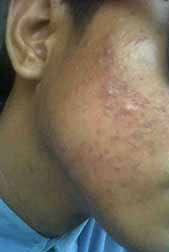
Examples include clay masks for acne blemishes, or acne “dots.” Acne dots are patches that cover blemishes and contain drying solutions, such as tea tree oil or salicylic acid.

"Knowing how much it's helped me, I hope that other people will now be given this treatment as an option instead of just trying the antibiotics. I then went on to the higher dose and within about three months everything was gone, all the spots had disappeared. Ms Cornick continued: "Initially I started on the lower dose and there was an improvement. "I think the worst thing for me was when one of my nieces said: 'Have you got chicken pox?'." People would stare and you almost feel that they're looking at you like you're dirty and don't wash properly. She was then given a higher dose of the drug and within a few months, her acne cleared up.

Ms Cornick said she started with a lower dose of spironolactone and saw improvement in her acne. Image: Kelly Cornick, who suffered from persistent acne Kelly Cornick, 39, from Dorset, who used the drug, said that she was previously prescribed various creams and the contraceptive pill to try and control her acne. Use of spironolactone reduces blood testosterone levels which can result in gynaecomastia (breast swelling), and concerns have been raised about loss of sexual function in men." The pair wrote in the British Medical Journal: "Unfortunately, spironolactone is not considered an acceptable treatment option for men with acne. Unfortunately, the drug is not suitable for men, according to Prof Santer and her co-author Alison Layton.

Home remedies for acne trial#
"The drug is already included in treatment guidelines for persistent acne in the US and Europe, and we hope this trial will lead to a change in the UK guidelines." She added: "We hope the publication of these results will mean more GPs and dermatologists feel confident to prescribe spironolactone as a treatment for acne. "These results show that spironolactone could offer an alternative to antibiotics for many women with persistent acne to use alongside topical acne treatments." Professor Miriam Santer, GP and co-lead of the trial said: "The results showed that the women taking spironolactone saw a significant improvement in their acne after 12 and 24 weeks compared to those on the placebo. After 12 and 24 weeks, women who were taking the drug saw significant improvements in their acne.


 0 kommentar(er)
0 kommentar(er)
